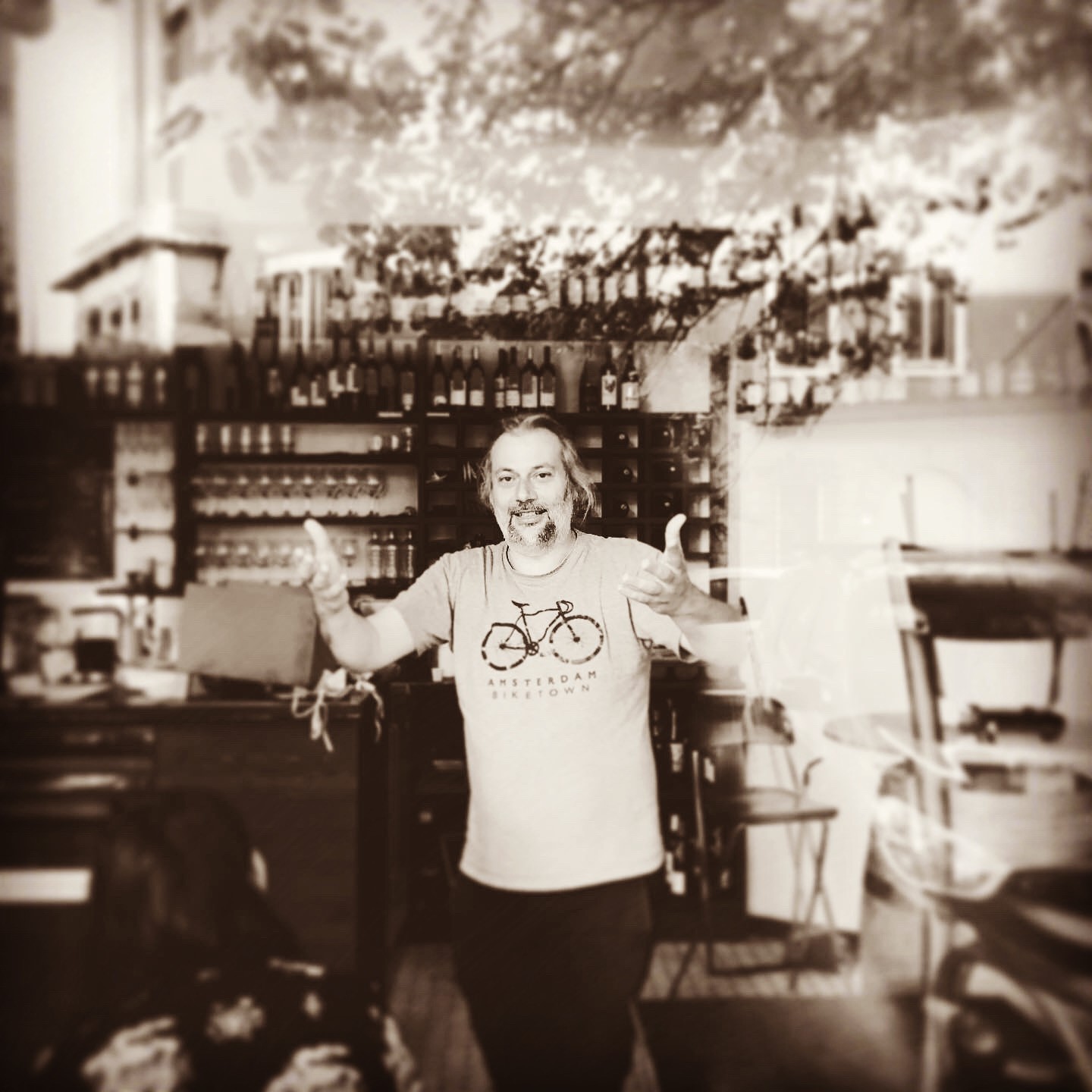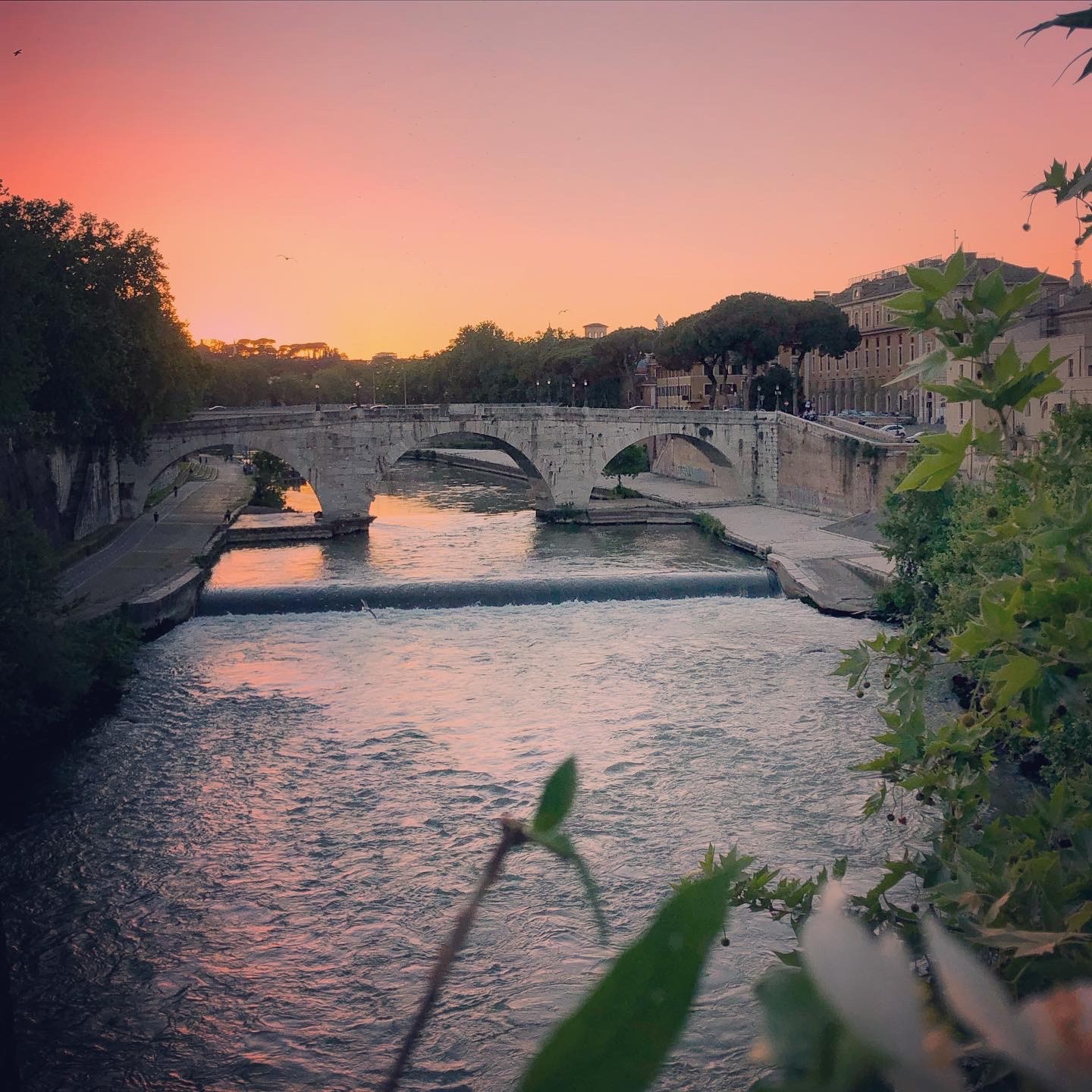Live from Italy Part 1 | Part 2 | Part 3 | Part 4 | Part 5 | Part 6
By Tina Rocchio
Each morning, I take my coffee and position myself in front of the big window in my daughter’s tiny room; for such a small room, it is an extraordinarily big window. It is the only window where the apartment gets direct sunlight. Sitting here, I scroll through social media, read online news reports and sometimes La Repubblica or Internazionale, the physical papers that I go down to the square to buy twice a week.
Mostly, I spend a lot of time listening to the birds and the voices, watching the clouds roll past, peeking at those out of my direct line of sight by watching their reflections in the windows across the way. Yes, visions of Hitchcock’s “Rear Window” sometimes do come to mind.
We’re now fully into the longer days of late spring. The weather inevitably brings us to consider where we’ll be a month or two from now, when (if) the lockdown is lifted. In what they say will be the hottest summer on record, how will we safely redistribute ourselves on this tiny peninsula where the concept of personal space has never been much of a cultural norm?

We’re used to crowding, standing or sitting nearly on top of each other in wine bars, at the cafe, in the squares, on buses and beaches. Only when I’m with friends and family visiting from the U.S. am I reminded of how we are accustomed to squeezing into places, our knees touching under tables, our arms rubbing as we gesticulate wildly over a glass of wine.
I’m often reminded of a trip to Sicily with my sister, 25 years ago now. She and Chris came on an extended summer trip to Italy that year. I was five months pregnant and they were yet to marry. Sicily would not have been their first choice, not that they didn’t love Sicily, but there was so much more of Italy that they would have liked to see. It had just so happened that my sister had already come to Sicily with us on her last visit. But my then-husband, who one might generously describe as a jovial dictator with a laugh as wide as the moon, would extend a plate of foraged wild berries or fresh mozzarella with one hand, while he made all decisions final with the other.
And so it was the four of us with two tents (or, as my brother-in-law would say, too tense) and all our gear, piled into our small Peugeot 205 with no air conditioning to make the 1,000-kilometer trip from Tuscany to Naro, stopping between Rome and Naples on the beautiful beach of Sperlonga to camp along the way.
WHY ARE THE CHAIRS SO SMALL?
We stayed in my ex-husband’s birthplace, a hilltop town with prehistoric origins in the southwestern Province of Agrigento. Naro gets its name from the Saracens who invaded Sicily in the ninth century, for the flamelike shape of its skyline visible from a distance (Nar means fire in Arabic). We stayed in the grotto family home where his aunt took care of our every need. Zia Palmina was a tiny white-haired Ursuline nun dressed traditionally in black, whose “only” work for 90 years was to take care of her family home, her mother, her siblings, the church, sacristy and priest.
It was here where my sister commented, “Why are the chairs so small?”
I’ve used this and countless similar observations by students and clients, friends and family over the years as I attempt to explain why Italy is the way it is, by all appearances a collective chaos held up by an extraordinary combination of natural beauty and centuries of engineering, architectural, artistic and aesthetic genius. The small size of everything from cars to chairs to, let’s face it, people is one of the most common observations from visitors. My brother once exclaimed from the back of a crowded bus in Rome, “I feel so tall here.” Anyone who knows him will know why that’s so funny.

PHASE TWO
May 4 saw the beginning of phase two of our lockdown. Considerations on what I call “spatial relations” in Italy are central as this new phase begins, the objective being to slowly and responsibly learn to live with the coronavirus in our midst.
When all is said and done, it emerges that phase two is, in fact, very similar to phase one, if not for the fact that 4.5 million people will return to work (including several more factories and construction sites) and some very limited, relative freedom for the rest of us.
For now, we are still meant to venture out as little as possible, only when necessary and within all the parameters of our new normal, at least 1 meter distant from one another (2 if running) and wearing masks in closed spaces. The hope is that we are successful enough to lift further measures on May 18 and again on June 1.
There's been a bit of easing into this. Some work resumed, slowly, quietly, over the past two weeks. In addition to the essential-needs stores like food, pharmacies and electronics, April 14 saw the reopening of children's clothing stores and bookstores. Why these two categories above all others will be the stuff of social and behavioral studies to come.
Restaurants, bars, gelateries and pizzerias are open for takeout. We can venture out for physical exercise beyond our own neighborhoods and some parks and gardens have reopened.
Funerals are now permitted with no more than 15 participants, preferably outside and with physical distancing at all times. It is just soul-crushing to think of a funeral with no physical contact.
The overriding disclaimer on all of this new activity is that people not gather. The prime minister explicitly said that foods purchased have to be consumed at home and not in the streets and piazzas. Customers are to enter the venues one at a time and lines outside must allow for a meter between patrons. Masks are mandatory inside and recommended outside. As such, the government has blocked the price of simple, washable surgical masks at 50 cents each and lifted VAT tax.
People will be able to visit “stable affections” who reside in the same region, but not for get-togethers or meals, nor parties or gatherings. Distance rules apply and masks must be worn, particularly in the presence of the elderly.
This last one is the stipulation that has caused the greatest outcry since Sunday’s press conference. It will forever be a staggering example of why words matter.
They chose to use the word "congiunto." Literally meaning "conjoined," it is used to describe relatives but is not so specific as the actual word for relatives, “parenti.” However, according to the government, nor is its connotation so vague as to stretch to include friendships.
WEEK OF ARGUMENTS
A week of arguments arose accusing the government of archaic paternalism, the traditional family-based logic that just doesn’t apply in the year 2020 to a large percentage of Italians (and non-Italians residing in Italy). It even prompted some to speak out for the “poor lovers,” those who already live in the shadows in the best of times and are now relegated to the broom closet for the odd spicy text message.
In speaking with a taxi driver last week, he remarked that the real ones to suffer were the “unofficials,” meaning clandestine lovers. “I just can’t imagine how they’re managing,” he said. My sense from the animus behind his words was that he could imagine exactly how they were managing.
And so it is, after much debate, that the government has had to actually delineate what they mean by "congiunto," adding "stable ties of affection," which implicitly includes lovers but explicitly does not include friends. My friends and I beg to differ. But we comply.
Another one of the most divisive and critical reactions was that the government is slipping from authoritative to authoritarian, infantilizing the public, insulting their intelligence rather than trusting them to use common sense of civic duty to act responsibly, as our neighbors in Greece, France and Germany purportedly are doing. In fact, we still need to circulate with a self-certification specifying where exactly we are going and why. If found to be false or were we without one we would be fined and possibly brought up on criminal charges.
ENLIGHTENMENT?
Ordinarily, I agree it is best to appeal for collaboration rather than impose subordination. But if my health is in the hands of the same people I’ve observed huddled on some of the street corners in my neighborhood, I have to say I'd rather err on the side of subordination, for there is no civic appeal some people will honor. In fact, any illusions of a new age of enlightenment were dashed when, on the first night of our new phase, traffic backed up an exit ramp, causing untold delays, all for the thrill of a McDonald’s drive-thru. It begs the question, How can we expect government to appeal to our common sense when the fact is our societies have not shared sense in common for generations now?
EASING INTO PHASE TWO WITH CAUTION
As I have no congiunti in the region of Lazio, and I have no workplace to return to beyond my kitchen table, my only justifiable reason to venture out remains removal of garbage, foraging for food and pharmaceuticals with the not insignificant added benefit of seeking rolling fields of green for long walks disguised as physical exercise.
One feels a bit wistful for the deafening silence that has accompanied these several weeks, and dread for the return of motors and horns. Pity the birds who were under the impression that the kingdom was theirs now and forever.
I did not rush out on the morning of May 4 like many but spent the day in quiet contemplation. I finally decided the new relative freedom deserved a fitting tribute and I took a sunset walk. Donning my mask, certification in hand, I stepped out into my square. Our local wine bar’s shutters were pulled up for the first time in over 55 days, the proprietor, Angelo, inside confabbing with some regulars. All thoughts are on how to reopen when the time comes with the appropriate safety and distance measures in place.
That, in light of the spatial relations mentioned earlier, will be no easy feat. Angelo’s wine bar, like everything else, is tiny. It seats 50 to 60 people uncomfortably around small tables in small chairs or on stools at the bar. The walls are lined with floor-to-ceiling shelves holding bottles of wine; every so often someone will accidentally knock one of the bottles down by putting on a jacket or shifting slightly on their chair.
Outside, sidewalk tables line the plate glass windows and people sit and stand in large groups of friends at tables meant for two. The crowded, noisy, raucous-filled vibe is part of its attraction and Angelo’s challenge now is to reinvent that vibe minus the crowding. I approached at the point in the conversation when he was saying they are considering chalice-holding lanyards and clearing the street of cars to make more room for customers to gather without touching. I left promising to meet for a distanced coffee this morning.
In fact, just around the corner from Angelo’s is the landmark bar, Bar Foschi. This is where, in ordinary times, we would be sitting on most weekend mornings, sometimes 10 of us to a table for four, reaching over a plate of fresh pastries for an ashtray or communal glass of water, stacking used cups and saucers to make way for new ones.
Coffee to go has never been accepted in Italy. It’s seen more of an aberration, the unnatural truncation of what actually lies behind having a coffee. An Italian bar bustles with chatter, camaraderie, meetings among friends and business interests.
The choreography of the counter sees baristas moving in continuous, intentional, swift motions, in spaces as tight as a boat’s galley. Trays float overhead, one moves the other with a gentle hand to the back, slipping by without incident. They utter commands to one another in tones only they can hear, while keeping the banter running with the regulars. It is precisely that hubbub that makes a bar a bar.

DAY TWO
This morning, on day two of our new phase, as I approached Bar Foschi, an entirely different scene awaited. I ran into Niccolò, my daughter’s best friend, and Angelo, from the wine bar, both masked. We held back our instinct to lean in for the customary two “bacetti,” one on each cheek. I took their orders at a distance and went in when it was my turn to enter. Fabio stood behind the counter and Francesca, his wife, stood ready at the cash register, both also masked. The freshly made pastries lined the glass cases between them.
While the idea of takeout coffee filled me with sadness yesterday, today just hearing the whirling of the steam machine brought a sense of hope. I ordered from behind the red-and-white striped tape and paid, maintaining my distance. Handing Niccolò his cornetto and Angelo his coffee, we waved goodbye from afar and ventured back to our respective confines to finally enjoy our goods from the bar. Alone. Sans hubbub.
Getting used to empty space will be the hardest thing for Italians. It will be this new distance, the space between us, the absence of crowds buzzing around a meal or a coffee the most glaring change to Italian lifestyle. Our gesticulating, which often includes a light hit on the shoulder of the person next to us or grabbing someone’s hand, just for emphasis and to make sure they’re paying attention, is an automatism that is hard to let go of; there is a longing for the return of a physical hello and goodbye.
We’re antsy to speak animatedly, one over the other, finishing each other’s sentences, jumping from one subject to the next, touching one another with a laugh, squeezing even more tightly together to pull up yet another chair for someone. To answer my sister’s question from a quarter of a century ago, the chairs are that small so as to fit as many people as possible in a small, intimate, jovial space.
The distancing tape, the certificates duly signed for our every move, the masks that cover our smiles and muffle our words are all the physical reminders of a new, foreign world. These changes to our social world will take the longest to embrace as our own.
Live from Italy Part 1 | Part 2 | Part 3 | Part 4 | Part 5 | Part 6







